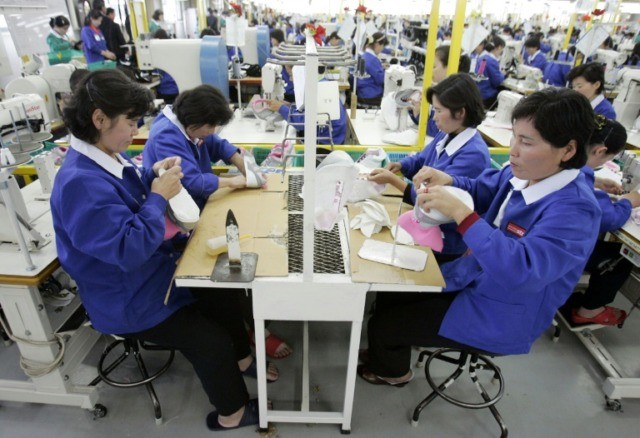Washington (AFP) – The United States on Tuesday imposed sanctions on two companies for exploiting North Korean overseas labor but joined allies Japan and South Korea in appealing for diplomacy to ease tensions with Pyongyang.
Showing a united front, Japan’s defense and foreign ministers and South Korea’s foreign minister all held talks with American counterparts Tuesday on both coasts, two weeks after North Korean leader Kim Jong Un threatened to launch a new weapon.
In a UN-backed bid to curb North Korea’s cash flow, the United States announced that it was freezing any US assets of the two companies and making any transactions with them a crime.
The Treasury Department targeted the Korea Namgang Trading Corporation, a North Korean firm which it said has maintained workers in Russia, Nigeria and the Middle East.
It also blacklisted Beijing Sukbakso, a Chinese company that has handled lodging and remittances for workers.
“The exportation of North Korean workers raises illicit revenue for the government of North Korea in violation of UN sanctions,” Treasury Secretary Steven Mnuchin said in a statement.
Under a UN resolution unanimously approved in 2017, countries had until December 22 last year to send back all workers from North Korea.
Human rights groups have charged that the workers live in virtually slavery-like conditions, with proceeds going to the cash-strapped regime in Pyongyang.
US officials said in 2017 that North Korea had some 100,000 overseas workers, bringing in $500 million a year.
The vast majority work in China and Russia although some have been seen around the world including in Eastern Europe, according to a study by the East-West Center.
The North Koreans are most frequently seen on construction sites, performing labor for long hours and staying in isolated housing.
The 2017 resolution came after nuclear and missile tests by North Korea, but US President Donald Trump soon afterward opened talks with North Korea, holding three landmark meetings with Kim.
The regime had been pressing unsuccessfully for the United States to remove sanctions in return and had set a New Year’s deadline.
– Growing unity among allies –
In a January 1 speech, Kim warned that he will no longer abide by the moratorium on nuclear and intercontinental ballistic missile tests and said Pyongyang would test a destructive new weapon.
Asked Tuesday if North Korea had made an idle threat, Defense Secretary Mike Esper declined to speculate but said the United States was prepared.
“We’ll see what happens. It’s in Kim Jong Un’s hands what he intends to do,” Esper told a news conference at the Pentagon with his Japanese counterpart, Taro Kono.
“We continue to send a message that we remain ready to fight tonight if necessary,” he said.
But he stressed: “The best path forward is through a diplomatic solution that results in the denuclearization of North Korea.”
Kono said that Japan, which has especially tense relations with North Korea, supported US pressure on Pyongyang.
Japan hopes that “Kim Jong Un can come to dialogue and, hopefully, he will make the right decision for his own people,” he said.
Esper emphasized unity with Japan and South Korea, mutual US allies whose relations sharply soured last year over disputes linked to Tokyo’s colonial rule of the Korean peninsula.
But tensions have since eased, with South Korea in November backing down on scrapping a military intelligence-sharing pact with Japan.
The Japanese and South Korean foreign ministers, Toshimitsu Motegi and Kang Kyung-hwa, met jointly Tuesday near San Francisco with Secretary of State Mike Pompeo.
The three “stressed that trilateral cooperation is essential to ensure the future of peace in the region,” State Department spokeswoman Morgan Ortagus said.

COMMENTS
Please let us know if you're having issues with commenting.